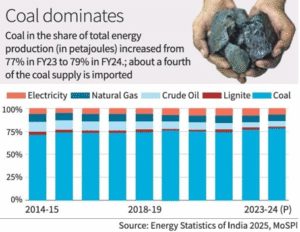
Why in News
-
A report titled “Regulating Coal Operations: Environmental and Social Impacts through the Lens of the NGT” was released on 26 August 2025 in New Delhi.
-
Key points:
-
Coal will remain important for India’s energy for many years.
-
Coal causes serious health and environmental problems.
-
The report calls for more community involvement and health studies in coal mining regions.
-
Why India Depends on Coal
-
Energy Security
-
Coal provides more than 70% of India’s electricity (2022–23).
-
Large reserves (~350 billion tonnes) reduce dependence on imported fuels.
-
-
Supports Industry
-
Coal-based power runs steel, cement, fertiliser, aluminium, and railways.
-
-
Cheaper and Already Built
-
Coal plants cost less to build and last longer.
-
India already has big railway and transport systems for coal.
-
-
Jobs for Millions
-
Mining provides work in Jharkhand, Chhattisgarh, Odisha, and West Bengal.
-
A quick coal exit would hurt many families.
-
-
Renewables Are Not Fully Reliable
-
Solar and wind are growing but cannot provide power 24×7 yet.
-
Coal ensures steady “baseload” electricity.
-
-
Transition Is Hard
-
India lacks enough money, technology, and plans to shift workers and communities smoothly away from coal.
-
Environmental and Health Problems
-
Air Pollution
-
Dust levels are five times higher than safe limits (examples: Jharia, Ennore).
-
-
Water Pollution
-
Fly ash leaks pollute rivers and damage soil.
-
-
Loss of Forests and Animals
-
Mining destroys forests and wildlife corridors.
-
-
Health Issues
-
Lung diseases, silicosis, and nerve problems from fly ash and metals.
-
-
Loss of Livelihoods
-
Farming, fishing, and cattle grazing decline, leading to poverty and migration.
-
Weakness in Governance
-
Pollution rules are often ignored (example: Ennore plant).
-
Farmers get little or delayed compensation (examples: Mejia, Chandrapur).
-
Tribals and forest dwellers are not properly included in decisions under the Forest Rights Act (2006).
-
Communities rarely have a real voice in decision-making.
Key Suggestions in the Report
-
Add Health Impact Assessments along with Environmental studies.
-
Involve locals, NGOs, and experts in monitoring coal projects.
-
Regularly check air, water, soil, and people’s health through independent audits.
-
Treat clean-up and restoration as urgent government tasks.
-
Plan for a “just transition”:
-
Protect workers.
-
Provide skill training.
-
Create alternative livelihood options.
-
Way Forward
-
Grow other energy sources: solar, offshore wind, and green hydrogen.
-
Create a Just Transition Fund to support workers and families in mining areas.
-
Make health studies compulsory in project approvals.
-
Strengthen NGT and Pollution Boards with community powers.
-
Reuse coal waste (fly ash in cement, bricks, and roads).
-
Use international funds like G-20, Green Climate Fund, and JETP to support the energy shift.
Conclusion
-
Coal will remain important for India’s energy in the coming decades.
-
But ignoring communities and weak rules will make health and environmental costs very high.
-
India must balance energy security, people’s welfare, and climate goals.




